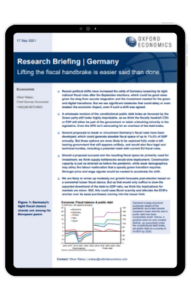Germany | Lifting the fiscal handbrake is easier said than done

Recent political shifts have increased the odds of Germany loosening its tight national fiscal rules after the September elections, which could be good news given the drag from secular stagnation and the investment needed for the green and digital transitions. But we see significant obstacles that could delay or even weaken the economic impact, even if such a shift was agreed.
What you will learn:
- A wholesale revision of the constitutional public debt brake as favoured by the Green party still looks highly improbable, as we think the fiscally hawkish CDU or FDP will either be part of the government or retain a blocking minority in the legislative. Even the SPD isn’t advocating for an overhaul of the debt brake.
- Several proposals to tweak or circumvent Germany’s fiscal rules have been developed, which could generate sizeable fiscal space of up to 1%-2% of GDP annually.
- Should a proposal succeed and the resulting fiscal space be primarily used for investment, we think supply bottlenecks would slow deployment.
Tags:
Related Services

Post
Food prices to bottom out in 2024, risks skewed to upside
Our baseline forecast is for world food commodity prices to register an annual decline this year, in aggregate, reducing pressure on food retail prices further downstream. However, we believe the risks to this forecast are overwhelmingly skewed to the upside.
Find Out More
Post
Battery raw material prices to recover
Battery raw materials prices bottomed out last quarter and we think a sustained recovery is looming. Midstream EV battery manufacturing activity has picked up again and inventories have returned to historical levels, suggesting upstream demand for raw materials will also bounce back.
Find Out More